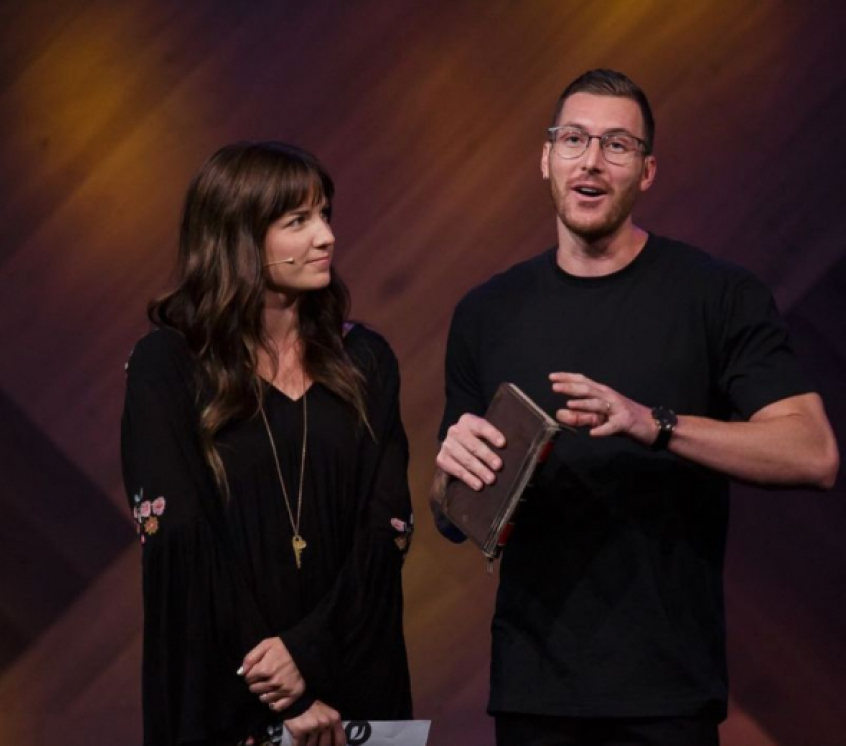Over the weekend, we heard the sad news that the lead pastor of Inland Hills Church in Chino, California had taken his own life. His wife Kayla shared on Twitter that her husband Andrew Stoecklein, 30, had died: 'Last night, the love of my life, the father of my children and the pastor of our incredible church took his last breath and went to be with Jesus.'
Our hearts and prayers go out to them.

There will no doubt be many people pontificating about the whys and wherefores of this tragic story, but I just want to bring a few simple thoughts to the table.
The fact that this news has hit the Christian press so quickly tells me something. There are many Christians in secular work who have come to the point that taking their life seems the only option for them. But apart from their friends and family, their passing often goes un-noticed to the rest of the world.
Part of me is pleased this news has spread across the oceans. This is going to hit their church and community so hard, and it will send ripples across Chino as the news spreads. Andrew's family and the church will need every prayer we can offer.
The spread of the news also raises the profile of mental health in ministry, in a way I hope will be helpful to many. Maybe it will be a wake-up call for our churches to care better for their leadership.
But there is another part of me that asks why it should be more shocking for a pastor to take his own life than anyone else. Pastors and ministers are human and will suffer from mental illness just like anyone else, in the same way they catch the flu, break limbs and get cancer. There have been many reports on depression and anxiety in the clergy, and surprise, surprise – it happens.
I don't know Andrew's situation, other than he had struggled with anxiety and depression for a long time. But I do know the pressure full time ministry can be on people. I still hear people wondering why a pastor needs a day off. The comment usually taking the form of 'I have a full time job outside the church, AND volunteer with my spare time. I don't get time to myself either.'
And therein lies the problem.
Ministry brings unique pressures that few understand. The pressures are spiritual, emotional, psychological and physical. The pressures can lead to burn out, depression and other illnesses, and if you already have an existing mental illness, then dealing with being a pastor can be an even bigger pressure. Some can manage it with planning and medication, others struggle to cope and don't feel they can talk to anyone for fear of being seen as a failure.
But it isn't a failure. Nor is it a lack of 'faith'. It often takes more faith, more trust and more 'grit' to live your Christian walk when you have mental illness. I stand in awe of my step son who carries on with his faith, and loves God so much, in spite of chronic mental illness.
Although I don't have any mental health issues myself, I have lived with it up close and personal in my family. But I have also seen the tide of accusations that hit those family members because 'Christians don't get depressed.' This meant that some of my family didn't get the professional help they needed.
I long to see an end to the stigma of mental illness for those who minister. I want to see our churches as a place where people can flourish, regardless of their 'position' and their mental health.
A small footnote. Andrew's family will forever be marked as 'the family of the pastor who took his own life'. I've seen it happen here in the UK when I did some children's work for a church. Two of the children were introduced first as the children of a pastor who had 'committed suicide'. Aside from the wording (the word committed implies a crime), It was sad I had to ask what the children's names were. Their names should have been the first thing spoken.
For these families, the grief has an added dimension, but it still grief. They still need support. And they need to be known by name – not 'The family of the pastor who...'
Kay Morgan-Gurr is chair of Children Matter and co-founder of the Additional Needs Alliance. Follow her on Twitter @KayMorgan_Gurr













